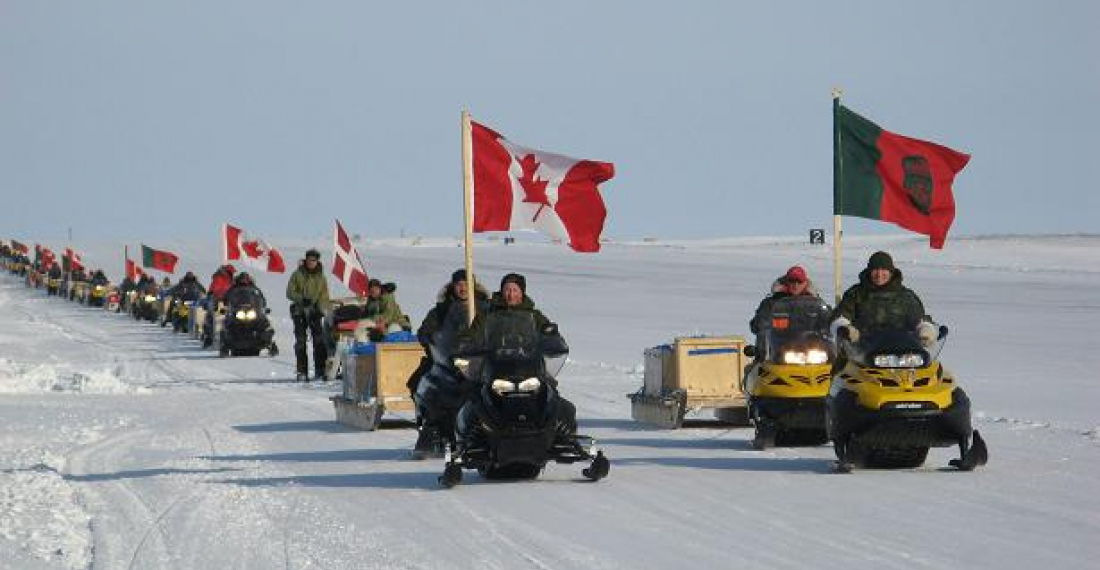NATO Secretary-General, Jens Stotlenberg, is visiting the Canadian Arctic Region, together with Canadian prime minister, Justin Trudeau to underline the strategic importance of the region for the Euro-Atltantic alliance.
"Russia’s brutal war on Ukraine is a game-changer for global security. It shows that we cannot take our security for granted – anywhere. NATO has responded with unity and resolve, determined to support Ukraine and keep our 1 billion people safe – everywhere", Stoltenberg wrote on Wednesday in an opinion piece for Canada's Globe and Mail newspaper.
Stoltenberg added:
"NATO is a defensive alliance. Our purpose is to prevent conflict and preserve peace. Much of the High North (Arctic territory and waters), has traditionally been an area of low tensions. But unfortunately, this is changing due to the rapidly warming climate and rising global competition. Increasing parts of the Arctic will be ice-free in summer. This is unlocking opportunities for shipping routes, natural resources and economic development. But it also raises the risk of tensions. Authoritarian regimes are clearly willing to use military intimidation or aggression to achieve their aims. At the same time, they are stepping up their activities and interest in the Arctic.
Russia has significantly increased its military activity in recent years, setting up a new Arctic Command, opening hundreds of new and former Soviet-era Arctic military sites, including airfields and deep-water ports, and using the region as test-bed for novel weapon systems. Last month, Russian President Vladimir Putin launched a new naval strategy pledging to protect Arctic waters “by all means,” including increased activity around the non-militarized Norwegian archipelago of Svalbard and hypersonic Zircon missile systems for its Northern Fleet. Just last week, Russia unveiled plans for a new strategic missile-carrying submarine cruiser for Arctic operations. Russia’s ability to disrupt Allied reinforcements across the North Atlantic is a strategic challenge to the Alliance.
China is also expanding its reach, declaring itself a “near-Arctic state” and planning a “Polar Silk Road” linking China to Europe via the Arctic. It is rapidly strengthening its navy, with plans to build the world’s biggest icebreaker vessel. China is also investing tens of billions of dollars in energy, infrastructure and research projects in the region. Earlier this year, Beijing and Moscow pledged to intensify practical co-operation in the Arctic, as part of a deepening strategic partnership that challenges our values and interests.
NATO has a clear interest in preserving security, stability and co-operation in the High North. The Arctic is the gateway to the North Atlantic, hosting vital trade, transport and communication links between North America and Europe. Ensuring freedom of navigation and unfettered access is essential to keep our economies strong and our people safe. Once Finland and Sweden join the Alliance, seven out of the eight Arctic states will be members of NATO. Finland and Sweden’s membership will significantly enhance our posture in the High North and our ability to reinforce our Baltic Allies.
NATO is already increasing our presence in the High North. A new NATO Command ensures that Atlantic sea lines of communication remain free and secure. Allies including Canada are investing in new air and maritime capabilities. NATO and NATO Allies regularly conduct Arctic and anti-submarine exercises to ensure we remain ready to operate in all conditions and defend every inch of Allied territory from any threat. Two of NATO’s largest exercises in recent years – Trident Juncture and Cold Response – were in the High North.
In this more dangerous and competitive world, NATO is increasing our presence and vigilance across the Alliance, including in the High North. With strength and unity, we will continue to deter aggression, protect our values and interests, and keep our people safe."






